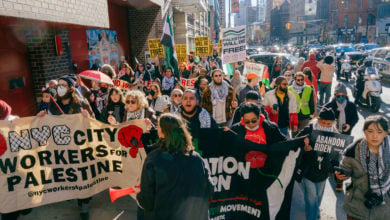In the latest chapter in the ongoing political crisis in Thailand, the Constitution Court has ordered the dissolution of the country’s ruling party for electoral fraud. Ousted Prime Minister Somchai Wongsawat and 36 other members of his People’s Power Party will be banned from politics for five years. New elections have been scheduled for Dec. 8.
|
Highlighting the tense political situation, King Bhumibol Adulyadej failed to deliver his traditional birthday address on Dec. 4. The official justification for the king’s silence was that he was receiving medical treatment for an infection, but many suspect the king made a conscious decision to stay out of the political turmoil.
Ruling-class parties vie for political power
At first glance, the PAD appears to be a progressive force opposed to a corrupt government. A closer examination, however, reveals a struggle for power between two competing sectors of the Thai ruling classes.
The PAD represents the traditional ruling class of Thailand. It is a coalition of right-wing business and academic elites supportive of the country’s monarchy. The group says it is funded by public donations, but most analysts suspect its main backers are business interests and the monarchy. Thailand’s King Bhumibol Adulyadej, however, has neither publicly backed nor condemned the group. Regardless of who backs the PAD, it is clearly well funded, owning a radio station, a satellite TV channel and a widely distributed online operation.
The PAD’s goal since its formation three years ago has been to overthrow the PPP, which it sees as a proxy for its predecessor, the Thai Rak Thai party led by former Prime Minister Thaksin Shinawatra. Thaksin, the PPP prime minister’s brother-in-law, was ousted in a 2006 military coup and is currently living in exile.
The PAD, fearful of the overwhelming electoral victories won by the PPP and Thai Rak Thai parties, has vowed to undo Thailand’s burgeoning capitalist democracy. It hopes to impose a system in which only 30 percent of parliament is directly elected by the people, arguing that the country’s poor are too uneducated to responsibly elect their own government. Under their system, the remaining 70 percent would be appointed to office.
“It is obvious now that the PAD proposal is very anti-democratic because they no longer believe in the politicians who are elected by the people,” said Supinya Klangnarong of a Bangkok-based lobby group called the Campaign for Popular Media Reform. (Al Jazeera, Nov. 26)
The PPP and the Thai Rak Thai were also capitalist political parties, but they made inroads with the impoverished rural and urban masses by delivering on campaign promises of progressive social policies, including low-cost health care, debt cancellation and easy access to micro credit.
Yet Thaksin—a billionaire tycoon who made his fortune in the telecommunications industry—was simultaneously willing to do Washington’s bidding. He negotiated a bilateral free trade agreement with the United States that would have eroded the very social policies he was most popular for, though ratification stalled in the wake of his ouster. Under his leadership, Thailand became integral to the “forward positioning” strategy of the Pentagon, allowing the U.S. military to use Thailand’s military bases for the wars in Iraq and Afghanistan.
The Thai military, for its part, moved cautiously throughout the recent crisis to avoid yet another coup, which would only exacerbate the already tenuous situation. In the wake of the 2006 coup, 15 months of direct military rule passed before a new government was reestablished, yet no resolution to the factional dispute was ever reached.
Eighteen military coups have occurred in Thailand since 1932, when the country established itself as a constitutional democracy (London Guardian, Oct. 7). Yet, prior to the court ruling dissolving the government, the PAD attempted to provoke yet another coup to oust the PPP.
Ongoing political turmoil
The judicial ouster of the PPP is only the most recent development in the ongoing political turmoil in Thailand.
In August, PAD members occupied the government’s main headquarters, forcing the ruling party to flee to a makeshift office at a Bangkok airport. Subsequent violence between the PAD and government supporters—including street clashes, shootings, bombings and grenade explosions—resulted in the deaths of several demonstrators on both sides.
In October, PAD members blocked all entrances to the country’s parliamentary building, locking government officials inside without access to food, water or electricity. The recent airport occupations again forced the PPP government to flee, this time to Chiang Mai, a city north of Bangkok considered to be Thaksin’s home turf.
The PAD’s occupations of Suvarnabhumi and Don Muang airports severely crippled international trade for the eighth largest economy in Asia. Suvarnabhumi alone moves about 100,000 passengers daily and handles an estimated 3 percent of the world’s air cargo. Thailand’s National Economic and Social Development Board estimated that the country could suffer $4.14 billion in losses and predicted the country’s economic growth could be reduced from an anticipated rate of 4 percent to as low as 2 percent. (Wall Street Journal, Nov. 29)
Violent confrontations escalated further Dec. 2, after pro-government forces assembled outside the PAD-occupied airports. One protester was killed and 22 others were wounded in a bomb blast at the Don Muang airport.
Independent organization of Thai masses the only way out
Despite the recent court ruling, pro-Thaksin political forces may still be capable of clinging to political power. The PPP said quickly after the announcement that members would regroup under a new formation, the Puea Thai Party, possibly led by Thaksin’s cousin, Chaisit Shinawatra. The new party is likely to win in new rounds of elections due to its continuing support by the country’s majority poor population. (The Economist, Nov. 29)
The working class and peasantry of Thailand, the overwhelming majority of the population, must break free from the manipulative leadership of the competing ruling-class political parties. Only by building their own independent forms of political organization can the exploited classes prevent their efforts from being channeled toward the ends of their exploiters. Armed with class-consciousness and the correct political orientation, the Thai masses can pursue their own class interests.






